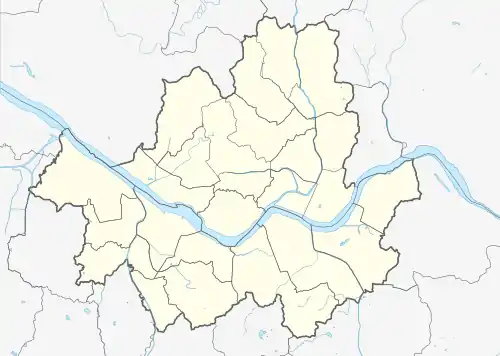SKY (universities)
SKY is an acronym used to refer to the three most prestigious universities in South Korea: Seoul National University, Korea University, and Yonsei University.[1] The term is widely used in South Korea, both in media broadcast and by the universities themselves.[2][3]
In South Korea, admission to one of the SKY universities is widely considered as determining one's career and social status.[4][5] Many of South Korea's most influential politicians, lawyers, physicians, engineers, journalists, professors, and policymakers (bureaucrats) have graduated from one of the SKY universities.
Members
| Institution | Type | Location | Established | Academic staff | Undergraduate enrollment | Postgraduate enrollment | Rankings | ||||
|---|---|---|---|---|---|---|---|---|---|---|---|
| ARWU World (2020)[6] | THE World (2021)[7] | QS World (2021)[8] | THE Asia (2020)[9] | QS Asia (2021)[10] | |||||||
| Seoul National University | Public (National) | Sillim-dong, Gwanak-gu, Seoul | 1946 | 2,130 (2019)[11] |
16,556 (2019)[11] |
11,228 (2019)[11] |
101–150 | 60 | 37 | 9 | 14 |
| Korea University | Private | Anam-dong, Seongbuk-gu, Seoul | 1905 | 1,442 (2019)[12] |
21,165 (2019)[12] |
8,592 (2019)[12] |
201–300 | 167 | 69 | 20 | 11 |
| Yonsei University | Private | Sinchon-dong, Seodaemun-gu, Seoul | 1885 | 1,682 (2019)[13] |
19,087 (2019)[13] |
11,229 (2019)[13] |
201–300 | 187 | 85 | 22 | 21 |
History
- 1885: Former Institute of Severance Medical College and Hospital (Part of Yonsei University) was established. First modern hospital and academic institution built in Korea.
- 1895: Former Institute of Seoul National University College of Law was established.
- 1905: Bosung College established
- 1915: Yonhi College established
- 1924: Headquarters and preparatory departments of Keijō Imperial University was founded by Japan. This university is the main predecessor to Seoul National University.
- 1926: Three Departments (Law, Medical Sciences, and Human Sciences) of Keijō Imperial University were opened by Japan. These were the first official higher education institution during the Colonial period. This university was the only university in Korea at the time due to oppression by Japan. The Japanese government did not approve the establishment of any university except Keijō Imperial University.
- 1946 August: Seoul National University founded by merging several Japanese institutions - including Keijō Imperial University - of higher education around Seoul
- 1946 August: Bosung College renamed Korea University
- 1946 August: Yonhi College renamed Yonhi University
- 1957 January: Severance Medical College and Hospital and Yonhi University merged into Yonsei University
National recognition
In 2010, it was reported that 46.3% of high government officials and 50% of CEOs of major financial industries were graduates of SKY universities.[14] Also, over 60% of the students who passed the 2010 Korean Bar examination were graduates of SKY universities.[15] Being admitted in one of these universities typically requires students to be within the top 1% of the Korean College Scholastic Ability Test.
Concerns
There have been a number of SKY university students who have dropped out of school to protest against South Korea's overheated academic elitism.[16]
In popular culture
- SKY Castle, a 2018-2019 JTBC Friday-Saturday prime time drama, explores the employment of coordinators by parents who wishes their children to enter one of the three colleges, which sometimes does not come without consequences.
- In the visual novel game Mystic Messenger, main character Yoosung Kim is a student at a school dubbed "SKY University".
See also
- Yonsei–Korea (Korea-Yonsei) rivalry
- Oxbridge, referring to the UK's oldest universities, Oxford and Cambridge
- Golden triangle, informal grouping of universities in London and southeast England
- Ivy League, formal grouping of elite older private universities in the United States
- The Big Three (HYP), an informal grouping of elite universities in the United States
- TU9, alliance of nine leading Technical Universities in Germany
- National Institutes of Technology, 31 leading public engineering universities in India
- Imperial Universities, grouping of elite older universities in Japan
- C9 League, Chinese Ministry of Education's formal grouping of elite universities in China
Further reading
- Jambor, Paul Z, "Why South Korean Universities Have Low International Rankings", Academic Leadership: Volume 7, Issue 1, February 20, 2009
- Jambor, Paul Z, "Why South Korean Universities Have Low International Rankings - Part II: The Student Side of the Equation", Academic Leadership: Volume 7, Issue 3, August 10, 2009
- Park, Chung-a, "Students Hold Anti-Exam Festival", The Korea Times, November 24, 2005, retrieved December 18, 2005
References
- Asia Times Online :: Korea News and Korean Business and Economy, Pyongyang News
- , , "Archived copy". Archived from the original on 2007-12-25. Retrieved 2007-10-18.CS1 maint: archived copy as title (link), , ,
- "Archived copy". Archived from the original on 2008-04-10. Retrieved 2008-04-09.CS1 maint: archived copy as title (link), , , Archived 2008-04-11 at the Wayback Machine, (articles in English)
- New York Times, "A Taste of Failure Fuels an Appetite for Success at South Korea’s Cram Schools"
-
- "Life and death exams in South Korea" by James Card, Asia Times Online, November 30, 2005, retrieved December 18, 2005.
- "Academic Ranking of World Universities 2020". Retrieved 16 August 2020.
- "World University Rankings 2021". Retrieved 12 October 2020.
- "QS World University Rankings 2021". Retrieved 19 June 2020.
- "Asia University Rankings 2020". Retrieved 4 June 2020.
- "QS Asia University Rankings 2021". Retrieved 25 November 2020.
- "Facts". Seoul National University. Retrieved November 13, 2019.
- "About KU". Korea University. Retrieved August 16, 2019.
- "Yonsei at a Glance". Yonsei University. Retrieved June 24, 2019.
- http://news.naver.com/main/read.nhn?mode=LSD&mid=sec&sid1=101&oid=013&aid=0002007480
- "Archived copy". Archived from the original on 2014-01-01. Retrieved 2013-08-11.CS1 maint: archived copy as title (link)
- Kim (김), Gyeong-su (경수) (2011-11-17). 명문대 줄잇는 ‘공개 자퇴’ 왜?. 파이낸셜뉴스 (in Korean). Retrieved 2011-11-20.
